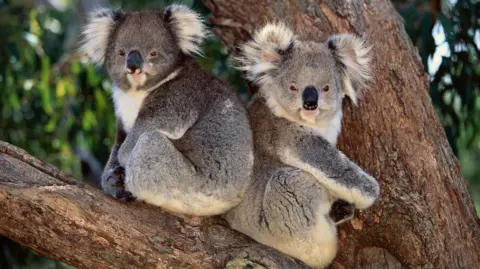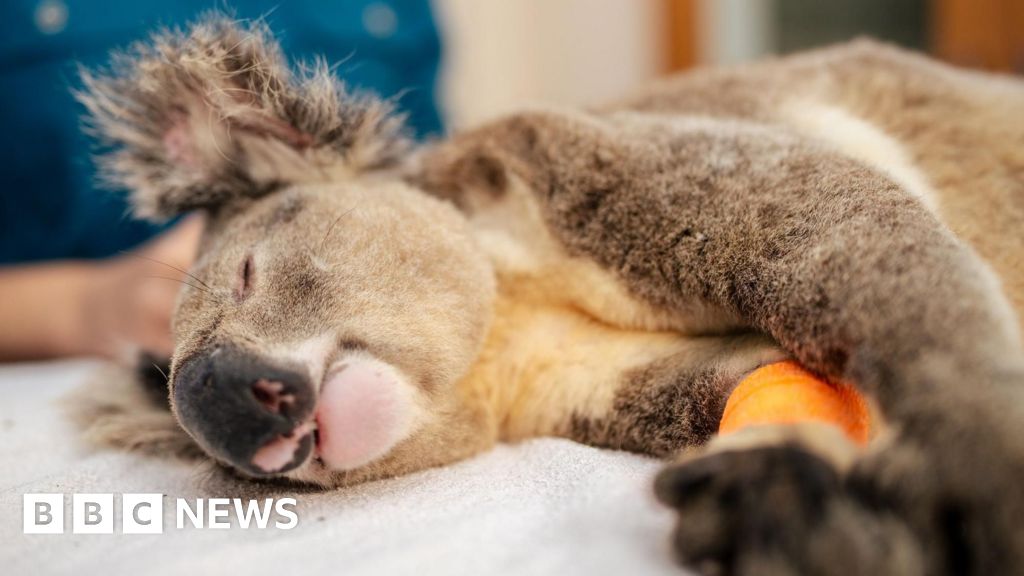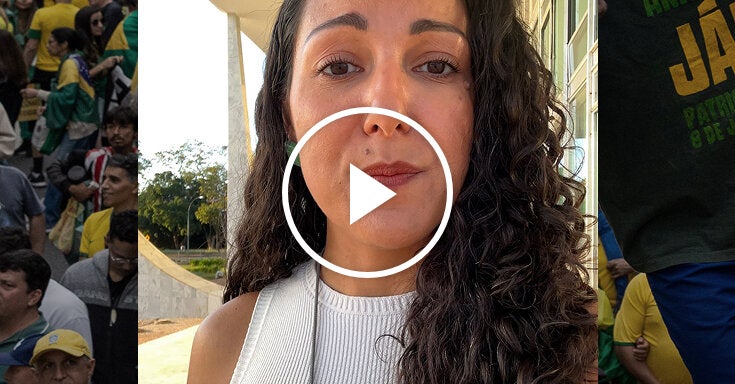Lana Lam and
Tiffanie TurnbullBBC News, Sydney
A vaccine which could save Australia’s endangered koala population from a rampant chlamydia epidemic has been approved for rollout for the first time.
University of the Sunshine Coast (UniSC) scientists have spent more than a decade developing a jab to curb the spread of the disease, which has devastated wild koala populations across most of eastern Australia.
“Some individual wild colonies, where infection rate can be as high as 70%, are edging closer to extinction every day,” Peter Timms said.
With approval from regulators now secured, he said the team hoped for major funding to distribute the vaccine to wildlife hospitals, vet clinics and koalas in the wild.
“It has been a long road… There’s been points along the pathway I think we nearly gave up,” Dr Timms, a microbiologist, said.
“Today’s a very exciting day.”
Chlamydia – which is transmitted by close contact or mating – can cause painful urinary tract infections, conjunctivitis, blindness and infertility in koalas, and is often fatal.
Both male and female koalas can contract the disease, which is a different strain to the one found in humans, while joeys can catch it through feeding in their mother’s pouch.
But treatment can be deadly too. Koalas infected with chlamydia are usually given antibiotics, but this destroys the gut bacteria which allow them to digest eucalyptus leaves – their primary food source – and can lead to starvation.
The much-loved national icon has faced increasing threats to its wild populations across much of eastern Australia in recent decades, from factors including land clearing, natural disasters, feral pests and urbanisation.
Chlamydia, however, has been the biggest killer – accounting for as much as 50% of deaths and claiming thousands of koalas. Some estimate only 50,000 of the animals remain in the wild, and there are fears they will be extinct in some states within a generation.
UniSC’s single-dose chlamydia vaccine has been tested on hundreds of wild koalas, and its approval by federal regulators was based on analysis of a decade’s worth of those trials – a study the university described as the largest and longest ever conducted on wild koalas.
 Getty Images
Getty Images“This study found [the vaccine] reduced the likelihood of koalas developing symptoms of chlamydia during breeding age and decreased mortality from the disease in wild populations by at least 65%,” said UniSC’s Sam Phillips.
The research team hopes to provide the vaccine for free, and that roll-out can begin as early as January next year, starting with wildlife hospitals and the most at-risk populations.
But treating chlamydia is extremely expensive, and locating, catching, and inoculating wild koalas even more costly, so the team doesn’t yet have the money to realise those dreams.
“To get funding now, so that we can do this next phrase where the vaccine actually becomes a reality… not just a trial, would be a pretty amazing thing,” Dr Timms said.
Though excited, he also stressed that the vaccine alone is not enough to save the species. The other factors driving koalas towards extinction must also be addressed, he said.
“Habitat loss is the most important thing – if you haven’t got a tree nothing much else matters.”
In a statement, the Environment Minister Murray Watt said the vaccine would help ensure that generations to come will still be able to see koalas in the wild, but that the government was also focused on species monitoring and habitat restoration.
Earlier this week, the New South Wales government announced that another 176,000 hectares – an area about the size of Greater London – would be added to existing nature reserves to create the Great Koala National Park, which it promised at an election two years ago.
It is estimated the new park will protect more than 12,000 koalas, and also provide a habitat for more than 100 other threatened species.





